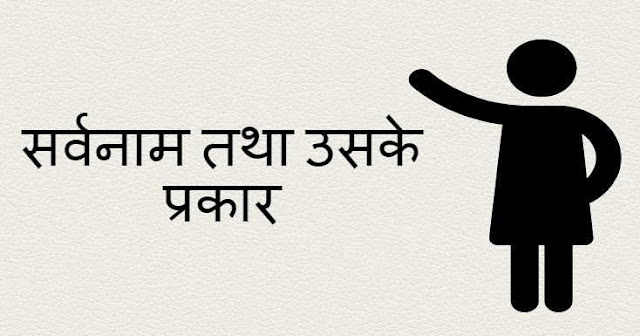सर्वनाम तथा उसके प्रकार – Pronoun and Types of Pronoun

Contents
सर्वनाम तथा उसके प्रकार – Pronoun and Types of Pronoun
सर्वनाम के प्रकार – Types of Pronoun
Example – What,Which,Why,Who
A pronoun is a word used in place of a noun to avoid repetition. Pronouns help make sentences simpler and clearer. They stand in for people, things, or concepts.
Types of Pronouns (Pronouns के प्रकार)
-
Personal Pronouns (व्यक्तिवाचक सर्वनाम)
These pronouns refer to specific people or things.-
First Person: I, We
-
Second Person: You
-
Third Person: He, She, It, They
Examples:
-
I am going to the market.
-
You should come here.
-
They are playing football.
-
-
Possessive Pronouns (स्वामित्ववाचक सर्वनाम)
These pronouns show ownership or possession.-
First Person: Mine, Ours
-
Second Person: Yours
-
Third Person: His, Hers, Its, Theirs
Examples:
-
This book is mine.
-
The house is theirs.
-
-
Reflexive Pronouns (प्रतिवाचक सर्वनाम)
These pronouns reflect the action back onto the subject. They are formed by adding “-self” or “-selves” to personal pronouns.-
Myself, Yourself, Himself, Herself, Itself, Ourselves, Themselves
Examples:
-
I hurt myself while playing.
-
She did it all by herself.
-
-
Relative Pronouns (संबंधवाचक सर्वनाम)
These pronouns introduce a relative clause and relate it to a noun in the sentence.-
Who, Whom, Which, That
Examples:
-
The man who is sitting there is my father.
-
This is the book that I was looking for.
-
-
Interrogative Pronouns (प्रश्नवाचक सर्वनाम)
These pronouns are used to ask questions.-
Who, What, Which, Whose
Examples:
-
Who is your best friend?
-
What is your name?
-
-
Demonstrative Pronouns (सूचक सर्वनाम)
These pronouns point to specific things or people.-
This, That, These, Those
Examples:
-
This is my car.
-
Those are beautiful flowers.
-
-
Indefinite Pronouns (अनिश्चित सर्वनाम)
These pronouns refer to people or things in a general way.-
Anyone, Someone, Everyone, No one, Anything, Everything, Nothing, Few, Many, All, Each
Examples:
-
Anyone can join the club.
-
Everything is ready for the party.
-
-
Distributive Pronouns (विभाजनवाचक सर्वनाम)
These pronouns refer to persons or things separately, rather than collectively.-
Each, Either, Neither
Examples:
-
Each of you will get a gift.
-
Neither of the two options is suitable.
-
Examples in Sentences:
-
Personal Pronouns:
-
I am going to the market.
-
She is my best friend.
-
-
Possessive Pronouns:
-
This pen is mine.
-
The decision is ours.
-
-
Reflexive Pronouns:
-
She looked at herself in the mirror.
-
I did it myself.
-
-
Relative Pronouns:
-
The book that you gave me is amazing.
-
I know the person who can help you.
-
-
Interrogative Pronouns:
-
Who is coming to the party?
-
What are you doing?
-
-
Demonstrative Pronouns:
-
This is my favorite song.
-
Those are my shoes.
-
-
Indefinite Pronouns:
-
Everyone was happy at the party.
-
Nothing is impossible.
-
-
Distributive Pronouns:
-
Each child received a gift.
-
Either option works for me.
-
These are the main types of pronouns in English grammar. Let me know if you’d like further examples or explanations!
